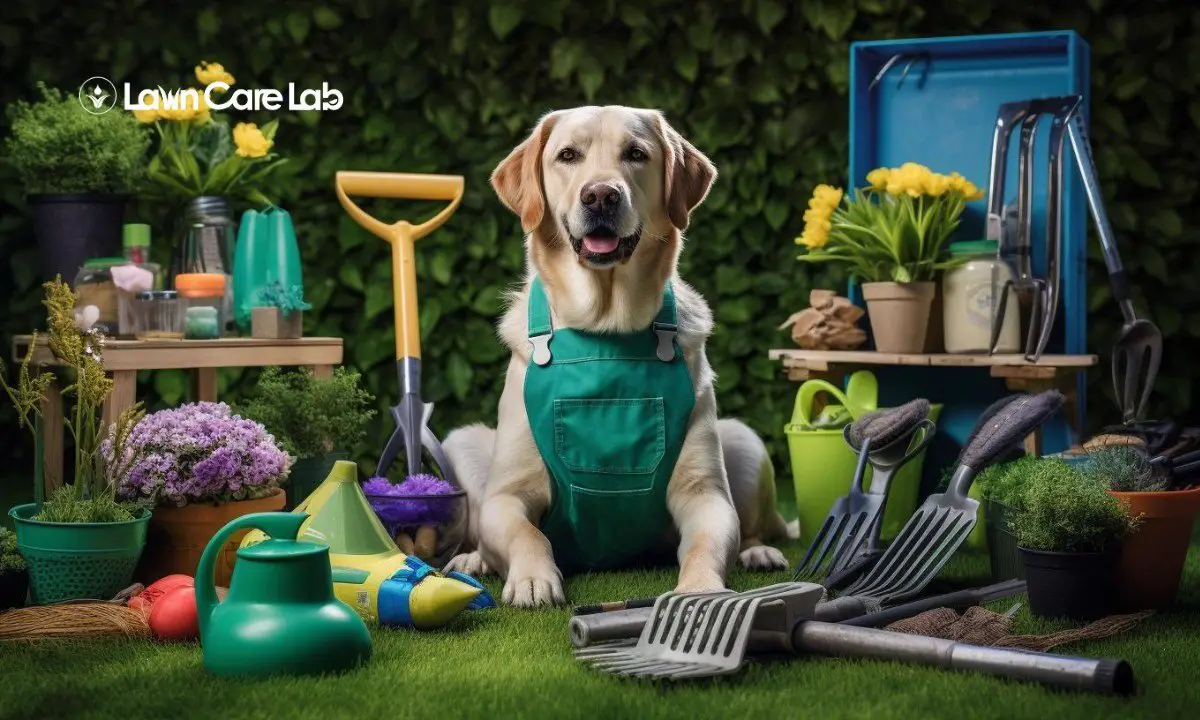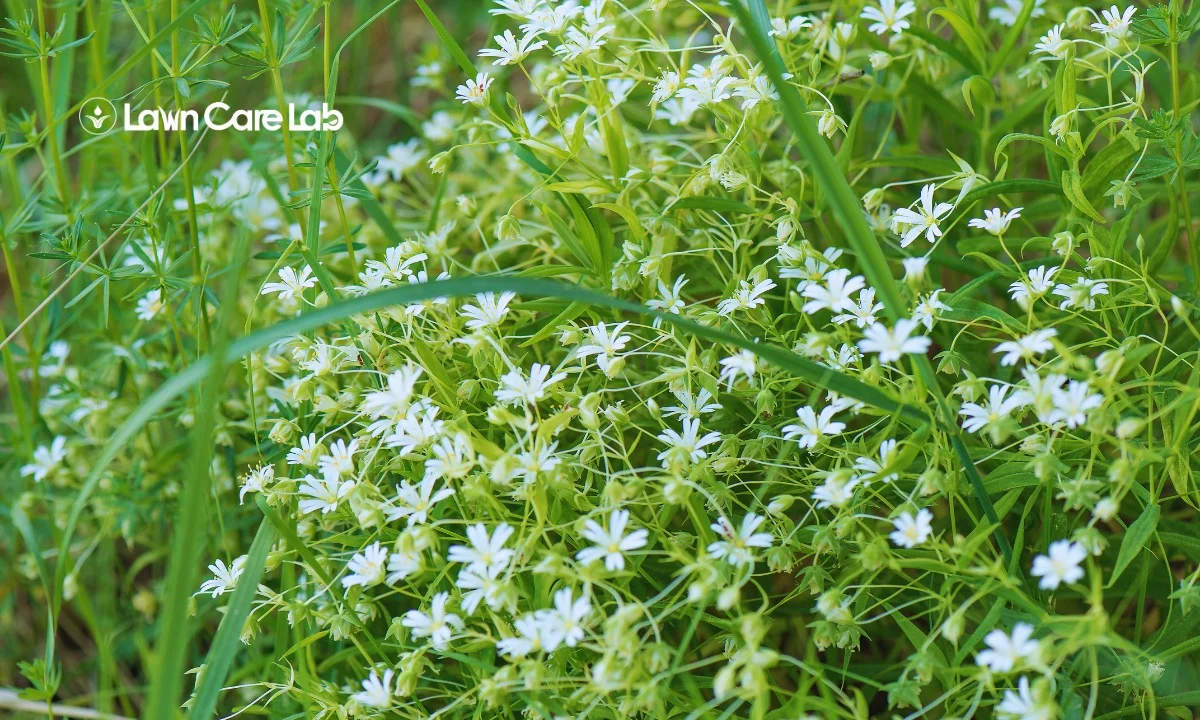As a loving pet owner, your lush, green lawn is your pride and joy. Yet, the well-being of your pet takes precedence over aesthetics. That’s why we’ve assembled crucial advice on non-toxic lawn care that balances verdant beauty with pet safety. Our guide offers crucial non-toxic lawn care tips to keep your garden beautiful and your pets healthy.
Learn to create a gorgeous, safe environment for your furry friends with our eco-friendly, pet-safe strategies. Let’s cultivate a green space that flourishes with life, both for your lawn and your beloved pet.
Table of Contents
Non-Toxic Lawn Care for Pets
Conventional lawn care products can harm pets. Non-toxic lawn care is eco-friendly and good for pets’ well-being.
Let’s discuss its advantages in providing a safe environment for our four-legged family members.
The Risks of Traditional Lawn Care Products
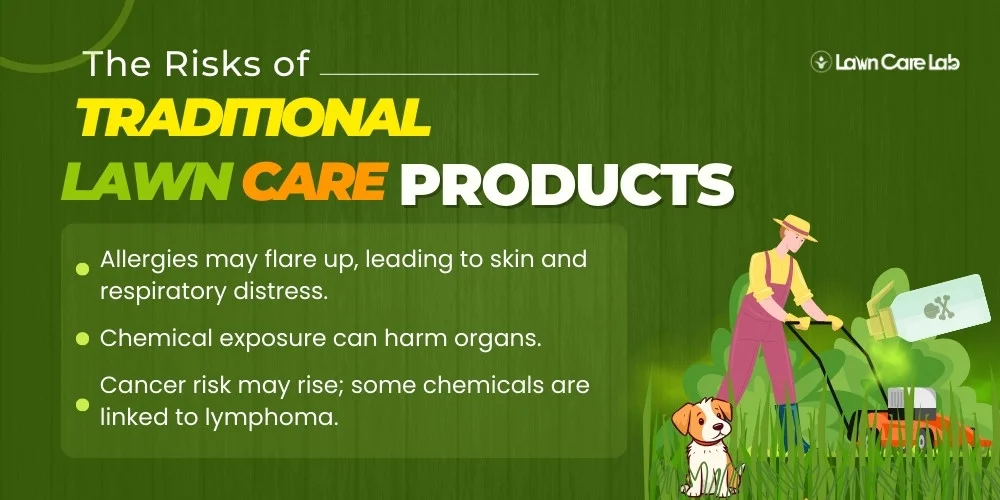
Traditional lawn care products can harm your pets. These chemicals can cause health problems and threaten your pet’s well-being.
Let’s break it down:
- Allergies may flare up, leading to skin and respiratory distress.
- Exposure to certain chemicals has been linked to organ damage.
- The shadow of cancer looms, with some substances increasing the potential for conditions like lymphoma.
Recognizing these threats is essential. It’s not just about treating an existing problem but preventing exposure in the first place.
Benefits of Non-Toxic Lawn Maintenance for Pet Health
The magic of non-toxic lawn care is twofold—it nurtures the land and the creatures who roam it. Let’s explore the advantages:
Diminished Health Risks from Harmful Chemicals
Chemical-based lawn care products can harm pets. They can cause mild to severe health issues and even cancer. Avoiding these products ensures a safer and healthier environment for your pets.
Enhanced Immunity for Your Pets
A chemical-free lawn supports a stronger immune system, reducing the occurrences of illness and nurturing a vibrant life for our pets.
Contribution to Environmental Health
Organic lawn care is good for pets and the planet. Sustainable practices like composting and natural weed control lead to a healthier ecosystem with richer soil biodiversity and fewer pollutants in waterways.
A Sustainable Approach to Lawn Care
Choosing non-toxic lawn maintenance practices is a commitment to valuing all life and promoting sustainable living.
Planning Your Non-Toxic Lawn Care Strategy
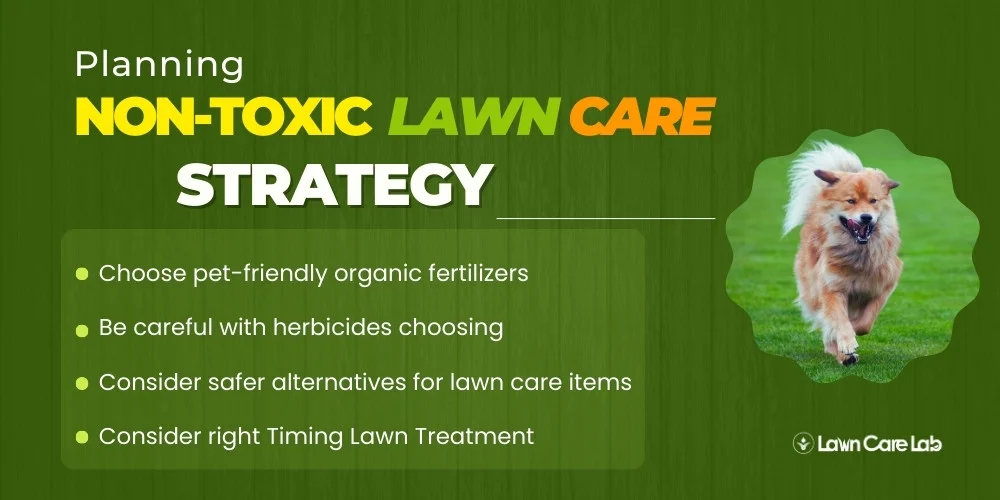
A lush lawn and a happy pet need not be mutually exclusive. With a thoughtful approach to lawn care, we can cultivate a slice of outdoor heaven that’s free from harsh substances.
Identifying Pet-Friendly Lawn Care Essentials
Creating a pet-safe lawn care strategy entails:
- Organic Fertilizers: Choose pet-friendly organic fertilizers like Espoma Organic Lawn Food to keep your lawn healthy without harming your pet.
- Herbicides: Be careful with herbicides containing 2,4-D, which can harm pets. Use products like Green Gobbler Vinegar Weed & Grass Killer instead.
- Non-Toxic Substitutes for Common Lawn Care Products: Consider safer alternatives for lawn care items, like using sand instead of salt for ice melting or shredded pine instead of cocoa mulch. Try Safe Paw Non-Toxic Ice Melter.
- Timing Lawn Treatment: Administer lawn treatments in the early morning or late evening. Keep pets indoors and wait a few hours before letting them outside.
Proper use and timing of pet-friendly solutions are vital for a toxin-free lawn.
Non-Toxic Lawn Care Practices to Adopt
Organic fertilizers provide essential nutrients without harm, and environmentally friendly ways can effectively manage weeds and pests. Avoid using harsh chemicals as they can cause more harm than benefit.
Natural Fertilizers That Keep Pets Safe
Consider using pet-friendly natural fertilizers that are beneficial for your lawn’s vitality and don’t contain any harmful chemicals.
The following is a trio of organic fertilizers worth considering:
- Composted manure is a nutrient-rich soil amendment that improves soil quality without the harsh effects of chemicals.
- Use seaweed to fertilize your lawn for healthy growth without attracting pets.
- Revamp your garden with fish emulsion, a potent blend of nitrogen, phosphorus, and potassium, watched by playful pets.
Appropriate application is the cornerstone of the effective use of these fertilizers.
Safe Weed Control Methods for Pet Owners
Pet owners can manage invasive plants in their lawns without compromising their pet’s safety by using non-toxic weed control measures.
- Wage a hands-on war against weeds with manual removal, reconnecting with the earth as pets frolic by your side.
- Employ boiling water—a scalding kiss of death for weeds yet leaving no lasting scars on earth or pet.
- Utilize corn gluten meal, a natural marvel that halts invaders in their tracks, safe for paws and people alike.
By making informed and conscious decisions, we can maintain a weed-free lawn without toxic chemicals. Our lawn care choices should prioritize safety for our pets and the environment.
Pest Management Without Harsh Chemicals
Adopting a few eco-friendly strategies can help manage pests without using harsh chemicals, keeping your yard safe for your pets. Here are some effective methods:
- Beneficial Nematodes: Use these microscopic worms as a natural pest control method. They target and destroy various pest larvae, promoting a healthier environment for your pets.
- Diatomaceous Earth: This fine powder comes from tiny fossilized aquatic creatures and is highly effective against pests such as fleas.
- Attracting Pest Predators: Strategically design your yard to welcome birds, frogs, and other creatures that naturally prey on pests.
By adopting organic practices, manage pests and create a safe outdoor space for your pets. Foster a natural ecosystem for your lawn’s maintenance.
Maintaining Your Lawn Naturally and Safely
Let’s discuss creating non-toxic lawn treatments and effective watering methods to keep your lawn healthy and safe for your pets. It’s important to care for the environment and avoid using harmful chemicals. With the right techniques, your lawn can remain lush without excessive watering or risk of harm to your pets.
DIY Non-Toxic Lawn Treatments
Protect your pets while keeping your lawn healthy with homemade, non-toxic treatments.
Here are a few concoctions you can create:
- Homemade sprays for pest management: Blend a mild, organic soap with water to craft a gentle yet potent pest repellent.
- Herbicides using vinegar: Merge vinegar, salt, and a hint of dish soap to create a non-toxic solution that combats weeds efficiently.
- Lawn solutions that are safe for pets: Melt Epsom salts in water to formulate a harmless, nutrient-dense lawn tonic.
Manage your lawn in a natural and safe manner, ensuring no harm comes to your beloved pets.
Effective Watering Techniques for a Healthy Lawn
Water your lawn deeply once a week, aiming for about an inch of water.
Watering deeply encourages strong root systems and reduces weed growth.
Water in the early morning to minimize evaporation.
Consider using smart technology and harvesting rainwater to make irrigation more efficient and eco-friendly.
Alternatives to Chemical Lawn Products
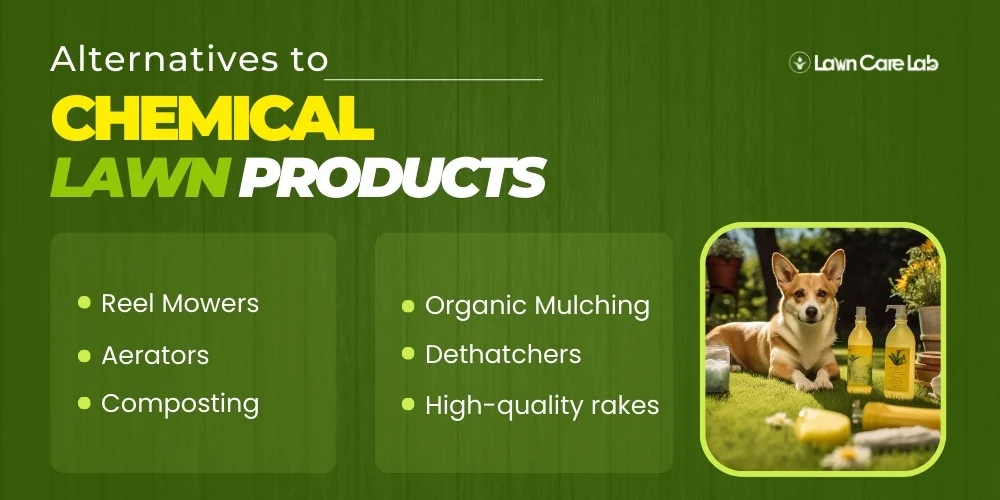
Understanding the potential hazards chemical lawn products present for your pets, it’s time to look at safer, more sustainable options. Think about using environmentally friendly garden gadgets and methods that not only safeguard your lawn’s well-being but also ensure the safety of your beloved animals.
Additionally, the practice of organic mulching and composting can improve your soil’s quality naturally, reducing the dependence on artificial fertilizers.
Eco-Friendly Tools and Equipment for Lawn Care
Maintaining a lush, green lawn that’s also safe for your pets doesn’t require harmful chemicals. A series of eco-friendly tools and equipment are available, which offer a more sustainable and safe approach.
- Reel Mowers: This eco-friendly mowing solution is user-friendly and low maintenance, making it a great choice for keeping your lawn tidy without harmful emissions. The absence of gas or exhaust ensures a healthier environment for both you and your pets.
- Aerators: Healthy soil is the foundation of a thriving lawn. Manual soil aerators enhance the aeration of your ground, encouraging better absorption of water and nutrients and diminishing the need for chemical treatments.
- Additional Mechanical Instruments: Embracing additional mechanical equipment can reduce reliance on chemical lawn products. Tools like dethatchers help remove lawn thatch, and high-quality rakes efficiently collect leaves and debris.
Opting for non-toxic lawn care methods ensures a safe playground for your pets and a healthier planet. It’s our small contribution to maintaining the ecological balance.
Organic Mulching and Composting
Choosing organic mulching and composting can significantly elevate your garden’s vitality. These methods offer a safe haven for your pets and stand as potent alternatives to chemical lawn care, enriching soil quality and naturally deterring pests. Embrace these earth-friendly practices to foster a vibrant and harmonious ecosystem for your plants and local wildlife.
Organic lawn care is safe for pets, enhances soil health, deters pests naturally, and is eco-friendly. In contrast, chemical methods can be dangerous to animals, degrade soil over time, rely on toxic substances for pest control, and have a negative environmental impact.
Your garden choices affect your pets’ welfare and local ecosystem. Switching to organic mulching and composting is beneficial.
Conclusion
Adopting a non-toxic approach to lawn care is a vital step in safeguarding the health of our pets. Careful planning and the use of natural methods rather than harmful chemicals can ensure a clean and secure environment for our beloved animals.
Take the initiative to learn more about non-toxic lawn maintenance. An attractive, lush lawn not only adds aesthetic value to your surroundings but also contributes to creating a secure and healthier space for your pets.
Join us in making our environment better while simultaneously ensuring the best care for our pets.
- How to Create a Lawn Care Schedule for Southern Climates - October 30, 2024
- How to Use Compost Tea to Boost Lawn Growth and Soil Health - October 23, 2024
- The Best Grasses for Saltwater-Exposed Lawns: Coastal Lawn Care - October 17, 2024

